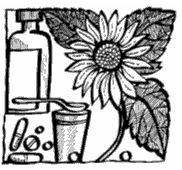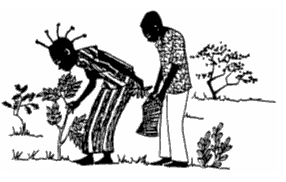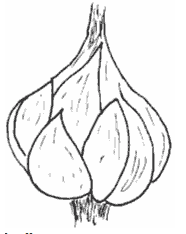Solarenergie für Afrika
Konferenz in Düsseldorf vom 4.-6. September 2003
Solar energy in Natural Medicine
Dr Keith Lindsey of anamed (Action for Natural Medicine)
Schafweide 77 | 71364 Winnenden | Germany
Tel: 0049 7195 910225 | Fax: 0049 7195 65367 | Email: anamed@t-online.de | Web: www.anamed.org
anamed (Action for Natural Medicine) is a growing, worldwide network of traditional healer, conventional health workers, community development workers, church workers and others.
Modern medicine vs traditional medicine
When we suffer illness here in Europe, we have the choice in our pharmacies of buying either conventional medicines, or a herbal remedy. If our illness becomes more severe, we can either go to a conventional doctor, or to a practitioner of alternative medicine.
In rural areas in Africa, many people have no choice. There may be no conventional doctor or hospital within reach. If there is a hospital, there may be no doctor. If there is a pharmacy, there may be no drugs. If there are drugs, they may be quite unaffordable. For these reasons, traditional healers offer the only possibility for health care.
Dr Hans-Martin Hirt, the founder of anamed, worked in the then Zaire from 1985 to 1991. He was responsible for importing medicines to all the hospitals in a particular region. Very quickly he realised that the prices of the drugs were gradually increasing, and at the same time the ability of local people to pay was rapidly declining, due to the very poor local economic situation. And in addition, the exchange rate constantly deteriorated. The result was, for example, that at the start of these 6 years, a teacher had to work for 3 hours in order to earn enough to pay for a treatment for sleeping sickness. After 6 years, this same teacher would have had to work for not 3 hours, or 3 days, or even 3 months but 3 years to earn enough to be able to buy the same treatment.
At an early stage Hans-Martin Hirt noticed that many people in the community were successfully treating themselves using plants that were growing locally. He says that there in rural Zaire he served a 6 year apprenticeship at the feet of local people, learning about the plants and the medical treatments they used. He kept detailed notes and, being a pharmacist, developed recipes for the hygienic production of good, well-labelled medicines for specific treatments from these local plants.
This knowledge was first written in French in a book with the title "La Medicine naturelle tropicale" This book was quickly translated into German and English, and is now also available in Spanish and Portuguese. The publication of these books heralded the establishment of anamed as a charitable development organisation based in Germany with the aim of enabling people in he Tropics to be self-reliant in their own health care by using locally available resources, in particular plants.
What is Natural Medicine?
Natural Medicine is the combination of the advantages of modern medicine with the advantages of traditional medicine. It builds on traditional practice by developing accurate, reproducible recipes for the production of medicines from medicinal plants for the treatment of the common and infectious diseases of the Tropics.
Today anamed is still achieves its aims by:
- running week-long training seminars in Natural Medicine;
- writing and distributing books and materials, and
- conducting research into some tropical healing plants, e.g. Artemisia annua to treat malaria, and the production of Natural Medicines.
anamed training seminars are run in various African countries, usually with a mixture of traditional healers and conventionally trained nurses and doctors. The seminars include:
- identifying medicinal plants and learning their scientific names.
- learning about soil fertility and soil conservation, and establishing a medicinal garden.
- making medicines such as teas, ointments, oils and tinctures.
- making and using a solar oven for cooking and drying herbs, and using plastic bottles to prepare drinking water.
In the production of Natural Medicines, anamed uses a minimum of energy:
- There is no transport by lorry, ship or plane involved in making medicines locally.
- There is no oil required to power a sophisticated pharmaceutical industry - the sun is an adequate source of energy for local, small scale production.
- Little energy is required for producing the packaging materials for Natural Medicines, e.g. no tablets are produced in aluminium foil.
Solar energy is used in Natural Medicine, in the form of the ULOG solar oven and drier, for:
- drying herbs
- separating honey from the comb
- preparing oils and ointments from leaves
- disinfecting clothes and bedding
- producing black stones
- producing medicinal oils from seeds
With the support of Dialog International, two anamed projects in the D. R. Congo use and promote ULOG solar ovens; one in Bukavu with Innocent Balagizi, and one in the Bandundu region t with Emmanuel Mufundu. Carpenters are trained to produce them, and they are used:
- to provide a constant supply of hot water.
- to dry food, e.g. rice, caterpillars (East Congo only!) and cassava (which often contains poisonous components if not very dry). Drying at an elevated temperature also kills insects and prevents fungal growths.
- to produce medicines.
- in training seminars, so that local people understand not only the principles of solar energy, but also hygiene, conservation of foodstuffs, and the essentials of Natural Medicine.
The projects experience the following difficulties:
- Solar ovens can be stolen, unlike the conventional fire.
- Solar ovens cost money. The result is that people will accept them as a gift, or participate in a training programme to build one, but will never buy one.
- Through the glass other people see that someone has food, and will come and beg.
- Glass is difficult to obtain.
- Most African people traditionally eat in the evening after dark.
Solar energy is also used by anamed
- in the simple solar water disinfection process using plastic bottles
- for powering a 12 volt slide projector for use in regions where there is no electricity.
- for powering lights.
anamed publications, available from the address above, include:
- "Natural Medicine in the Tropics: I Tropical plants as a source of health care. Production of medicines and cosmetics." (English Second Edition 2001) by Hans-Martin Hirt and Bindanda M'Pia.
Also available in German: "Natürliche Medizin in den Tropen", French: "La Médecine Naturelle Tropicale", Spanish: "Medicina Natural" and Ukrainian.
This book describes the social and economic imperative for Natural Medicine, 15 plants in great detail, 50 more plants and natural products and how to make teas, oils and medicines.
-
The poster: "Healing Plants in the Tropics"
Available in English, French, German and Portuguese.
- "Natural Medicine in the Tropics: II Treatments"
by Hans-Martin Hirt and Keith Lindsey. This book is used as our handbook in training seminars It is available in English, French, Portuguese and Swahili.
- "Natural Medicine in the Tropics: III Seminar Leader's Resource Kit"
A large collection of materials for group discussions, technical projects and Biblical reflections for those wishing to run seminars themselves.
- "Natural Medicine in the Tropics: IV AIDS and Natural Medicine"
Natural medicine for strengthening the immune system and treating opportunistic infections. We do not propose that HIV/AIDS can be cured with Natural Medicine.



